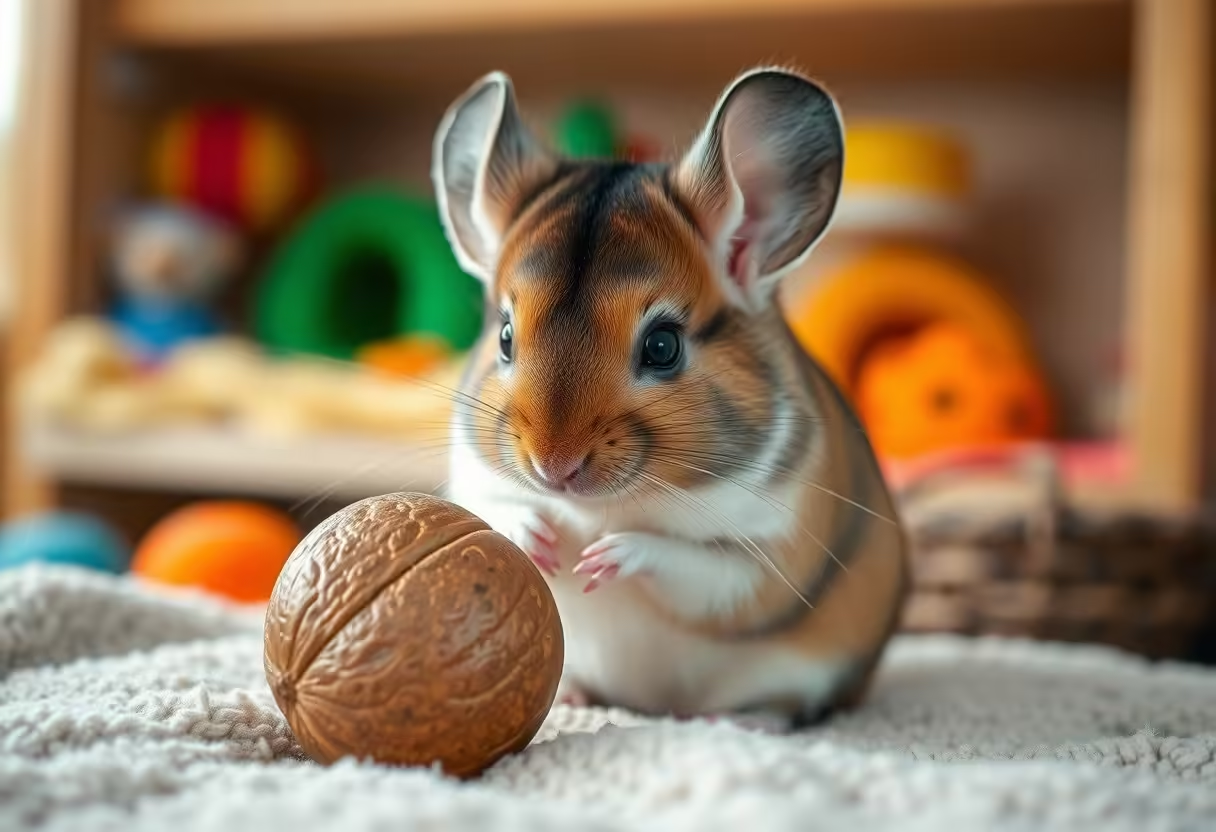No, Walnuts Are Not Suitable for Chinchillas Chinchillas require a high-fiber, low-fat diet to maintain their health. Walnuts, while nutritious for humans, are unsuitable for chinchillas due to their high fat content. Feeding walnuts to your chinchilla can lead to digestive upset, obesity, and other health issues. Here, we’ll explore the risks of walnuts and offer safer treat alternatives to keep your chinchilla thriving.
Key Takeaways
- Walnuts are not recommended for chinchillas due to their high fat and low fiber content.
- Feeding walnuts regularly can cause obesity, digestive issues, and nutritional imbalances.
- Safer treats like hay-based snacks or apple slices are better options for chinchillas.

Nutritional Profile of Walnuts
| Nutrient | Amount (per 28g serving) | Impact on Chinchillas |
|---|---|---|
| Fat | ~18g | Can lead to obesity and liver strain. |
| Fiber | ~2g | Insufficient for chinchilla dietary needs. |
| Protein | ~4g | Not optimal for chinchilla nutrition. |
| Omega-3 Fatty Acids | ~2.5g | Beneficial but unnecessary in excess. |
Walnuts are calorie-dense and rich in fats, making them unsuitable for chinchillas, whose digestive systems are not equipped to process such foods.
Why Walnuts Are Harmful to Chinchillas
1. High-Fat Content
- Walnuts contain around 65% fat by weight, far exceeding what a chinchilla’s diet can tolerate.
- Regular consumption can cause rapid weight gain, leading to obesity and related health issues like fatty liver disease.
2. Digestive Upset
- Chinchillas have sensitive digestive systems designed to process fibrous foods like hay. The low fiber and high fat in walnuts can result in:
- Diarrhea.
- Bloating.
- Stomach pain.
3. Risk of Allergic Reactions
- Some chinchillas may be allergic to compounds in walnuts. Symptoms include itching, lethargy, and changes in appetite.
Safe Alternatives to Walnuts
Instead of walnuts, choose treats that align with your chinchilla’s nutritional needs:
| Safe Treat | Why It’s Beneficial |
|---|---|
| Timothy hay | High in fiber; essential for digestion. |
| Apple slices | Low in sugar; offers a natural, healthy snack. |
| Dried rosehips | Rich in antioxidants; safe in small amounts. |
| Bell peppers | Low-calorie treat packed with vitamins. |
| Hay-based cubes | Promote dental health and are highly digestible. |
Foods to Avoid
| Unsafe Treats | Why It’s Harmful |
|---|---|
| Nuts and seeds | High in fat, difficult to digest. |
| Dried fruits | Excessive sugar content. |
| Spinach or kale | High in calcium, can cause kidney stones. |
Safe Feeding Guidelines for Treats
- Limit Treat Frequency
- Treats should make up no more than 5–10% of your chinchilla’s daily diet.
- Proper Portion Size
- If offering treats like apple slices or dried rosehips, give only a small piece (1–2 teaspoons).
- Monitor for Adverse Reactions
- Introduce new treats gradually and observe for signs of digestive upset, such as diarrhea or lethargy.
FAQs
Q: Can chinchillas eat walnuts in small amounts?
A: Walnuts are not recommended even in small amounts due to their high fat content. Opt for safer treats like timothy hay cubes or a tiny piece of apple instead.
Q: What happens if my chinchilla accidentally eats a walnut?
A: Monitor your chinchilla for signs of digestive upset, such as diarrhea or lethargy. If symptoms persist, contact a veterinarian immediately.
Q: Are other nuts safe for chinchillas?
A: No, nuts in general are unsuitable for chinchillas due to their high fat content. This includes almonds, cashews, and peanuts.
Q: How often can I give my chinchilla treats?
A: Treats should be offered no more than 2–3 times per week and in very small quantities to maintain a balanced diet.
Conclusion
Walnuts are not a safe or suitable food for chinchillas. Their high fat and low fiber content can cause digestive issues, obesity, and nutritional imbalances. Instead, focus on a diet of high-quality hay, chinchilla-specific pellets, and occasional safe treats like dried rosehips or apple slices.
By prioritizing a balanced diet and avoiding harmful foods, you can ensure your chinchilla lives a happy, healthy life. Always consult a veterinarian if you’re unsure about introducing new foods to your pet’s diet.
